
Related
Guests
- Francisco RodríguezVenezuelan economist and a professor of public and international affairs at the University of Denver’s Korbel School of International Studies.
The number of asylum seekers from Cuba and Venezuela is expected to grow as the Trump-era Title 42 asylum restriction ends. A group of House Democrats are urging the Biden administration to lift sanctions on the countries, which they say are driving people to leave their homes out of economic desperation. We speak with Venezuelan economist Francisco Rodríguez, author of a new report for the Center for Economic Policy and Research, “The Human Consequences of Economic Sanctions.”
Transcript
AMY GOODMAN: This is Democracy Now!, democracynow.org, The War and Peace Report. I’m Amy Goodman.
As Title 42 ends, officials say they expect to see more asylum seekers from many countries, including Cuba and Venezuela. On Wednesday, a group of 21 House Democrats urged President Biden to lift sanctions on both countries, calling them failed and indiscriminate, and adding that, quote, “experts widely agree that broad-based U.S. sanctions — expanded to an unprecedented level by former President Donald Trump — are a critical contributing factor in the current increase in migration,” unquote.
Well, for more, we go to Francisco Rodríguez, a Venezuelan economist, author of a new report for the Center for Economic Policy and Research titled “The Human Consequences of Economic Sanctions.” Rodríguez is a professor of public and international affairs at the University of Denver’s Korbel School of International Studies. He headed the Venezuelan National Assembly’s Economic and Financial Advisory Office under the late President Hugo Chávez.
We welcome you back to Democracy Now!, Francisco Rodríguez. Can you lay out what you feel how these sanctions connect to the migration to the United States from Venezuela and Cuba?
FRANCISCO RODRÍGUEZ: Yes. Good morning, Amy. Thanks for having me on the show.
Effectively, there is significant evidence, surveyed in the report that I just authored, as well as in other academic studies, that economic sanctions have an adverse effect, a major adverse effect, on living conditions in targeted countries. Some of the studies find that the imposition of sanctions by the U.S. leads to a decline in income per capita of up to 26%. That’s the equivalent of causing a Great Depression. Another study found increases — or, declines in life expectancy of between 1.2 and 1.4 years. That’s the equivalent of the mortality effects of the COVID pandemic.
So, when sanctions are imposed on a country like Venezuela and like Cuba, they lead to a major economic contraction. In Venezuela, GDP per capita has fallen by 72%. And this has generated a massive exodus. Almost 25% of the population has left. And many of them are trying to make their way to the border and trying to enter the United States. So, definitely, we have economically induced migration in both of these countries, and there’s a strong contribution of economic sanctions. In the case of Venezuela, sanctions have targeted the oil industry. The oil industry produces 95% of the country’s foreign currency revenue. So, if the country can’t sell oil, it can’t import basic goods, it can’t import food, it can’t import medicines. So living conditions deteriorate markedly. And that’s why people want to leave.
AMY GOODMAN: So, the Biden administration has said it’s willing to lift some sanctions against Venezuela in exchange for steps taken by Nicolás Maduro’s government, such as not banning opposition candidates from running against him. But most of the sanctions that Biden inherited from Trump remain in place. Your response? And talk about how the humanitarian crisis is increased at home, as well, in Venezuela by these sanctions.
FRANCISCO RODRÍGUEZ: Yeah. Well, I think that that response is basically making vulnerable Venezuelans, those who are more oppressed by Maduro, pay the cost of the sanctions. So, to say we’re going to lift sanctions, which are hurting Venezuelans, if Maduro takes steps toward democracy, well, Maduro is probably not going to take those steps, and the people who are going to pay the cost are the Venezuelans, and more vulnerable Venezuelans. And you’ve seen huge deteriorations, huge increases in levels of malnutrition, of mortality, both adult and child mortality in Venezuela. You’ve seen deteriorations, a decline in wages, where wages have fallen below $5 a month.
And all of this, I must stress, is driven by a decline in oil revenues. So, Venezuela’s economy shrank by 72% in the same period in which oil revenues declined by 93%. And while the cause of the decline in oil revenues — I mean, there are several causes. I’m not claiming in any way that sanctions are the only one, but there’s research showing that sanctions have a major effect on oil production. Sanctions — the imposition of sanctions in August 2017, in January of 2019 and February of 2020 is, in every single instance, associated with accelerations in the rate of decline of oil production. So it’s clear that Venezuela doesn’t have the foreign currency revenue that it needs in order to keep its economy working and feed its people, and a great part of the responsibility of this lies on U.S. economic sanctions.
AMY GOODMAN: Can you also talk about how last year London’s High Court ruled against Venezuela’s President Maduro in a $1 billion gold battle? What effect does that have?
FRANCISCO RODRÍGUEZ: Yeah, yeah. Well, it has a significant effect, but it’s symptomatic of a broader problem, which is that one of the reasons why the Venezuelan government has been unable to deal with the pandemic and unable to deal with the recession is that it doesn’t have access to its international funds. And those funds, it’s barred from access to them not just because of sanctions, but because of the decision of the United States and the United Kingdom to recognize the government of Juan Guaidó, an opposition leader who claimed that he was the legitimate president of Venezuela.
And the U.S. and the U.K. broke completely with diplomatic convention when they did this. Typically what governments do is that they recognize the government that has de facto control over the territory, even if you don’t like it, because you realize that that’s the government that you need to engage with. So, the U.S. recognizes many dictatorships around the world. It recognizes the government of North Korea. It recognizes the government of Iran. But it decided to recognize the Guaidó government, and so did the U.K., therefore handing it over control over assets such as the international reserves of the Central Bank, which is what Venezuela needs to address its economic crisis.
Venezuela made a proposal to use those resources in the Bank of England to buy vaccines in the midst of the COVID crisis, but that was rejected because the court is trying to clarify whether — well, what will be the result of that suit, which is a lawsuit between the Central Bank board that was appointed by the Maduro government and an alternate Central Bank board that was appointed by the Guaidó government.
We have a similar problem in the International Monetary Fund. Venezuela did not have access to the funds to fight the COVID emergency that were created by the issuance of special drawing rights at the International Monetary Fund, and that’s because the U.S. has blocked recognition of the government that has control of the territory, which is the Maduro government. It’s insisted that the legitimate government — even though the Guaidó government has already been dissolved, it’s still insisting that the Maduro government not have access to the resources that the IMF approved for all countries to be able to fight the pandemic.
So, the U.S. spent 25% of GDP in dealing with the pandemic. Latin America spent less than 5%, because it didn’t have access to the same resources. Venezuela was able to spend less than 1% of its GDP, because it was unable to tap the resources that the international community had created and allocated to deal with this emergency.
AMY GOODMAN: We don’t have much time left, but your report also not only looks at sanctions against Venezuela, against Cuba, but Syria, and what that meant especially with the earthquake that just hit.
FRANCISCO RODRÍGUEZ: Yes. The result surveys 32 studies, of which 30 find negative consistent effects of sanctions on indications — on indicators ranging from GDP per capita to mortality, life expectancy, living conditions in general.
In the case of Syria, we have seen also very significant negative effects. And, in fact, sanctions have interfered with earthquake relief. Earlier in the year, GoFundMe actually suspended any attempts — any account requesting the raising of funds for Syria earthquake relief. And that was as a response — it’s a phenomenon known as overcompliance. It’s not — the U.S. claims that there are humanitarian exceptions, and it puts humanitarian exceptions in the regulations that it publishes, but the reality is that the exceptions are so vague and so hard to follow that most financial institutions say, “We’re not going to take the risk of getting into trouble, and we’re not going to process transactions for countries like Syria.”
And therefore, you see that — and you see this systematically across the board — the humanitarian exceptions are not effective. And in the case of Iran, for example, you found that the medicines that were not available in Iran during the periods of sanctions, out of 73 medicines, 70 of them were in the OFAC exemptions list, but it’s still the case that no bank would process the transactions, given that the country was a sanctioned country. So, sanctions impede the access to funds that are necessary to cover humanitarian aid in cases of emergency relief, such as those of the Syria earthquake.
AMY GOODMAN: Francisco Rodríguez, I want to thank you for that very quick analysis of the effect of sanctions, from Venezuela to Syria, Venezuelan economist. Thank you so much for being with us, from the University of Denver, speaking to us from Aurora. He headed the National Assembly’s Economic and Financial Advisory Office under Venezuela’s late President Hugo Chávez. His new report for the Center for Economic Policy and Research is titled “The Human Consequences of Economic Sanctions.”
Coming up, Pakistan’s former Prime Minister Imran Khan has been freed, after his arrest sparked mass protests and a number of deaths. Stay with us.

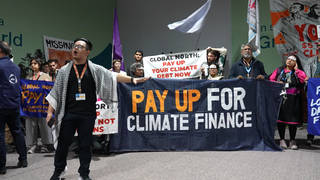
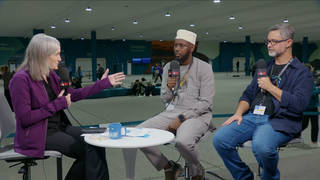
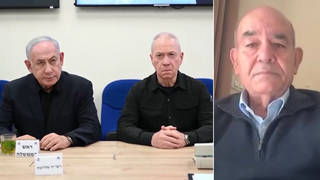
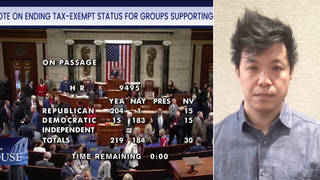






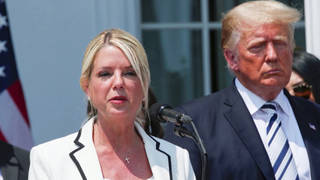
Media Options